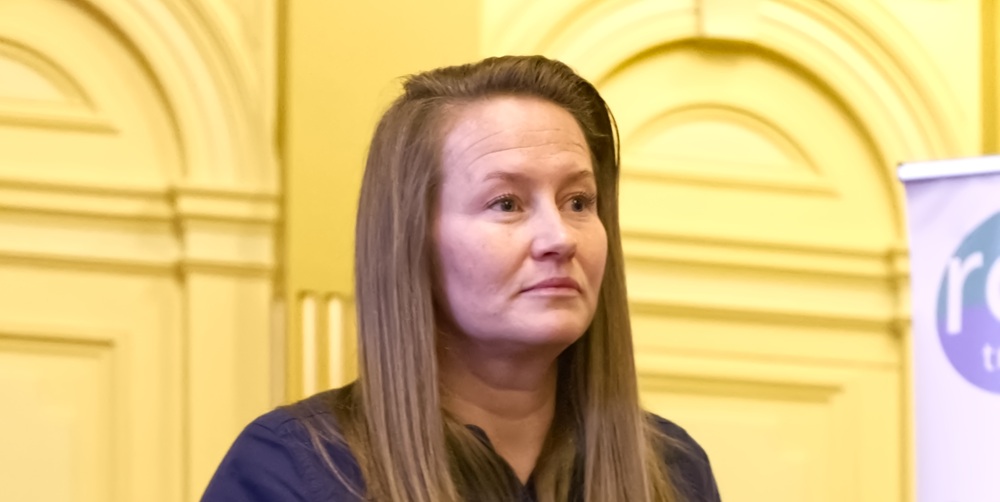

Diane Scott joined PFA Scotland as their Player Support Officer just over a year ago and will be standing for Chair at the next PPF Wellbeing Committee meeting. Her role has given her the perfect way to combine her experience as a player and working in football with her counselling background.
How did you progress from being a player to working for the player body representing footballers in Scotland?
I played for Partick Thistle and always had a keen interest in how sport can help with mental health and wellbeing, starting with volunteering in the community while playing football and I supported the delivery of local football sessions for the Partick Thistle Charitable Trust. I then did a degree in Sports Coaching before joining the charitable trust full-time, contributing to programme delivery across the community and then progressing into the role of managing the Trust itself. During this time I also gained a Masters in Counselling and Pyschotherapy whilst also working for the Trust so when I saw the role at PFA Scotland, I knew this was the perfect career move to make use of all the knowledge and experience I’d developed.
How have you found your first year in the role as Player Support Officer?
I’ve been really finding my feet. When I joined this role hadn’t fully developed so I had the freedom to make the role my own, really taking time to understand how best I can support the players, working on building engagement, meeting players and getting them to understand who I am. It’s been about building relationships and asking players ‘what can I do to help you?’
What do you think is key to the support you can provide?
I want to help players understand that the more people they have to turn to the better. Some players may not feel comfortable talking to club personnel, others may have 3 or 4 other people they can speak to but others may only have me and knowing that support is there at the other end of the phone or in person, that they’re not alone is really important. Often players don’t want to burden partners or want their parents to worry, they feel it’s a hassle but it’s literally my job to be there for players and it’s important for them to know I’m here for them.
How do you liaise with the wider support available at PFA Scotland?
When I first joined, I reviewed the existing mental health support and what more we could offer. I picked the brains of other union reps and what support services they provided which led us to offer a 24 hour support line through Sporting Chance which has given easier access and wider network of experts to speak to. We also work with the RCA Trust around problem gambling and addiction. Through them I will be speaking at a gambling summit in Glasgow which will give me a useful platform to explain to politicians and policy makers on why footballers are particularly at risk from gambling addiction.
What do you most enjoy about your job?
With everything I’ve done, I love helping people the most, either during face to face conversations or over the phone. Feeling that someone can come to me and trust me, whether it’s signposting them or just sometimes having a coffee, it doesn’t have to be as drastic as needing additional support, it’s just being a friendly ear and using empathetic listening skills which can make someone feel a lot better, sometimes it doesn’t need to be anything more than that.
What are the biggest challenges in your role?
Helping players realise that they are not superhuman and that addressing issues early on is so important. As professional sportspeople, they do face an extra layer of challenges that can play a lot of havoc with mental health, they’re in the limelight and their job is to be mentally and physically fit and so it’s about getting that message across not just to players but to clubs too. Once they realize how much PFA Scotland can do to help, often when they can’t afford someone in this sort of role, they don’t have a financial commitment but can point their player in the right direction.
What is your key priority for the season ahead?
My priority is to get in front of as many players as possible. Education is really important, getting into clubs and putting on workshops so we’re talking about mental wellbeing with players so we’re running sessions on gambling, financial wellbeing, discrimination, many of the things that can have an impact. We want to help players understand more about these areas and then they can feel empowered to get help if necessary.
How helpful is it to be part of the PPF?
It’s been immensely useful to look at what other Player Associations are doing in the wellbeing space and more advanced ways of providing services. It’s always good to have those conversations with others who’ve got ideas and inform the group about what we’re doing. That collaboration and sharing of ideas is vitally important and I’m really glad it’s there.